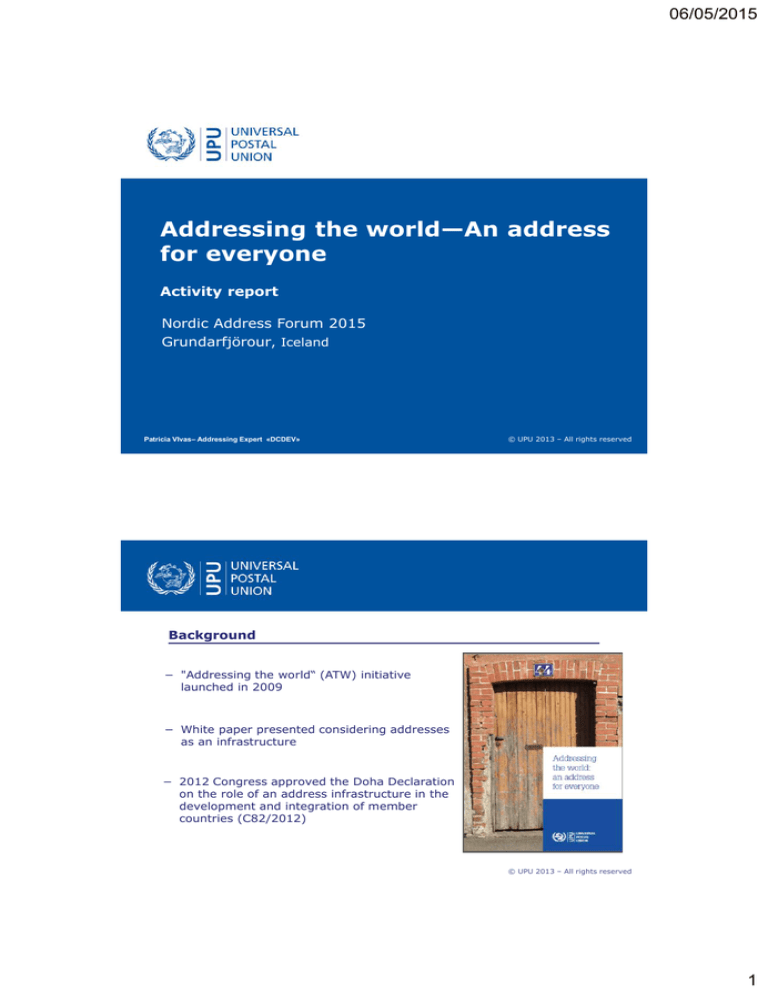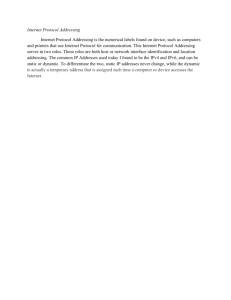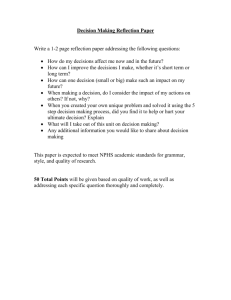
06/05/2015
Addressing the world—An address
for everyone
Activity report
Nordic Address Forum 2015
Grundarfjörour, Iceland
Patricia VIvas– Addressing Expert «DCDEV»
© UPU 2013 – All rights reserved
© UPU 2011 – Tous droits réservés
Background
− "Addressing the world“ (ATW) initiative
launched in 2009
− White paper presented considering addresses
as an infrastructure
− 2012 Congress approved the Doha Declaration
on the role of an address infrastructure in the
development and integration of member
countries (C82/2012)
© UPU 2013 – All rights reserved
1
06/05/2015
Objectives of the ATW initiative
−
raise awareness of importance of addresses for national
infrastructure and socio-economic development
−
create synergies among addressing players
−
define strategy for tackling lack of quality addressing systems
−
provide forum for exchange of ideas, assistance and shared
experiences
Ultimate goal: to provide everyone with an address
© UPU 2013 – All rights reserved
Why “Addressing the world”?
Addresses are
an essential
tool for socioeconomic
development,
yet many
countries do
not have them
Addresses are essential for:
Individuals
Governments
Businesses
- access legal
identity
- facilitate policy
planning
- develop new
markets
- partake in the
economy as a
consumer
- deliver public
services
- facilitate service
delivery
- receive letters
- collect taxes
- dispatch
emergency
services
- locate clients
and providers
- order goods
online
- direct marketing
© UPU 2013 – All rights reserved
2
06/05/2015
Highlights
UNDP
Final report of the UNDP Commission
on Legal Empowerment of the Poor
Over 4 billion people live outside of the
rule of law and have no legal identity
recognized by state institutions
Address is often a prerequisite to
obtaining legal identity
WB
Land registration covers less than
10% of the population. Street
addressing is an alternative to
formal regularization of property
rights
Street addressing projects involving
taxation were the most prevalent
out of the 15 sample countries.
© UPU 2013 – All rights reserved
What do addresses mean for the Post?
Providing home
delivery
• Identify households
• Organize delivery
rounds
• Reduce ecological
footprint
• Save time and money
Simplifying postal
processes
• Organize delivery in a
rational manner, not on
personal knowledge
Growing new
markets
• Parcels
• E-commerce
• Improve postal operations
• Comply with international
standards (J+5)
• Prerequisite for automation
© UPU 2013 – All rights reserved
3
06/05/2015
Addressing and postcode current situation
© UPU 2013 – All rights reserved
What is the current situation of addressing?
− Incomplete or not standardized addresses have a direct impact on
postal operators' ability to provide quality postal service
− Postal addresses and addressing standards essential for processing
and delivery and for efficient and economical services
− Several Congress resolutions encourage the development of ecommerce (ECOMPRO) as a way to growth postal market. However,
how to order or deliver an item without addresses?
© UPU 2013 – All rights reserved
4
06/05/2015
Overview of addressing and postcodes in
Europe and CIS countries
60
50
Establishment of postal addressing
standards
40
Use of addressing standards
30
Establishment of Postcodes
Use of Postcodes
20
Working in addressing projects
10
0
1
2
3
4
5
© UPU 2013 – All rights reserved
Addressing status: worldwide
© UPU 2013 – All rights reserved
5
06/05/2015
Addressing status: PAPU countries
© UPU 2013 – All rights reserved
What the UPU is doing on addressing?
© UPU 2013 – All rights reserved
6
06/05/2015
The mandate
Congress
Raise
awareness
among
governments
and users
Promote
solidarity and
cooperation
Improve the
addressing
situation
Foster dialogue with
donor agencies and
international
organizations
© UPU 2013 – All rights reserved
Addressing the world - Report on activities – Promote
solidarity and cooperation
Promote
solidarity
Best practices
Cooperation
A cooperation agreement with France to provide
addressing assistance to French-speaking countries
in Africa has been signed
Negotiations with Saudi Arabia to help other
countries integrate GIS in the development of
addresses (funding and training) are under way
A MoU is being prepared with a major GIS software
provider to support addressing projects with
licences and training
© UPU 2013 – All rights reserved
7
06/05/2015
Addressing the world - Report on activities – Improve
the addressing situation
Harmonisation
UPU regulations
and forms
Address tools
Draft article and an addressing data model have
been prepared
Study on the use of Geographical Information
Systems (GIS) for the creation of addressing
systems
© UPU 2013 – All rights reserved
Study on the use of GIS for the creation of addressing systems
Many countries already using GIS for their
addressing purposes
Main goal of study to provide advice and
solutions for those countries wishing to
start using GIS
Future goal of developing a GIS tool for
addressing
www.esri.com
© UPU 2013 – All rights reserved
8
06/05/2015
The study
- introduces geospatial concepts
- relates GIS to the field of addressing
- summarizes what has been done
- describes the steps to integrate GIS
into addressing projects
- discusses the creation of postcodes
and physical addresses using GIS
- emphasizes the importance of project
design and geographic data
collection and creation
© UPU 2013 – All rights reserved
Contents
Introduction
What is GIS?
GIS in addressing:
international scale solutions
GIS in addressing for
postcodes
GIS in addressing for physical
addresses
Review of existing systems
Integrating GIS into an addressing
projects
Prerequisites
Project design
Data collection
Existing geographic data
sources
Postal data
Next steps
Conclusions
© UPU 2013 – All rights reserved
9
06/05/2015
Addressing the world - Report on activities – Improve
the addressing situation
Harmonisation
UPU regulations
and forms
Draft article and an addressing data model have
been prepared
Address tools
Study on the use of Geographical Information
Systems (GIS) for the creation of addressing
systems
Call for papers
Find innovative addressing solutions able to
simplify and expedite the provision of address at
lower cost
© UPU 2013 – All rights reserved
Call for papers- what is it?
Opens:
1 October
Closes:
21 December
Notification of
finalists:
22 January
A competition to
find innovative
addressing solutions
able to simplify and
expedite the
provision of
addresses at lower
costs
a call to put
everyone on the
map and to
improve the ability
of various
stakeholders to
deliver goods and
services
An opportunity
for individuals or
organizations from
any discipline or
industry to submit
their innovative,
scalable and costeffective solutions
© UPU 2013 – All rights reserved
10
06/05/2015
Call for papers – Challenges
Inclusive challenge
Following a recent government decision to recognize and
formalize an illegal urban settlement in a capital city, the local
authority wants to introduce an addressing system that combines
the use of a physical addressing infrastructure on the ground and
delivery point/address data stored in a simple address database.
The area in question has recently undergone dramatic growth and
now accounts for at least 10% of the capital city's population. The
area's houses were built in a haphazard manner, usually clustered
along the two main access roads. Furthermore, there is no current
information on the total number of properties or houses in the
area, or even a map of the neighbourhood layout.
Postal challenge
A postal service provider would like to deliver items (letters and
parcels) to homes in a particular district of a city. The city, which
has a population of some 1.5 million, is divided into several
districts, which are themselves subdivided into formal
neighbourhoods. Addresses exist for only parts of the
neighbourhoods (some street names exist and some plot numbers
are used for identification). The district the postal provider would
like to serve has a population of about 300'000, comprising 80'000
households.
- 5 challenges
- Inclusive challenge
- Urban challenge
- Postal challenge
- Preparedness
challenge
- Open challenge
- Steps to gather,
formalize and use
delivery point data
- Multiple publics should
be able to use the
solution for different
purposes
© UPU 2013 – All rights reserved
Call for papers – Results
Results – Stage 1:
22 pre-proposals received by the end of December
Results of individual scoring were consolidated and scored
12 proposals obtained over 100 points, being selected for the second part
Further adjudication – Stage 2
Authors of the 12 most promising proposals were invited in January to
submit a full paper, including information on the implementation process,
resources needed, sources, and literature cited.
All this information should be sent to the UPU by 22 May 2015
The final proposals will be published by the UPU and the authors will receive
an award of recognition
The 3 finalists will be notified by the end of July and invited to present their
solutions at the 2015 Addressing Conference in Berne, October 26-27
© UPU 2013 – All rights reserved
11
06/05/2015
Addressing the world – Global Addressing Conference
Bern, 26 and 27 October 2015
The aim
Re-energize addressing partners
and the wider global community:
- by confirming the link between
addressing and development
and
- by offering new solutions to
these challenges so that an
address for everyone can
become a reality
Explore new replicable and
resource-saving technologies that
offer the opportunity to create
addressing systems more easily
© UPU 2013 – All rights reserved
Conference preparations – Update
Conference Structure
Proposed Thematic areas of discussion:
Dialogue 1: Illustrate the Economic & Social value of an address
infrastructure;
Dialogue 2: New technologies at the service of addressing;
Dialogue 3: Sustainable funding mechanisms for addressing
projects;
Call for papers: presentation of the 3 best innovative solutions
Day 2; Capacity-building through a hands-on session;
Real examples of up-to-date, user-friendly models for developing
addressing systems,
Integrating use of new technologies.
Generic training e.g.; address data collection, mapping, or GIS, and
Case studies
Speakers:
To be carefully selected to ensure a dynamic conference,
Include untraditional address users; economists, UN or government
players , e-commerce merchants & e-tailers,
© UPU 2013 – All rights reserved
12
06/05/2015
Conclusions
Addresses are a fundamental tool for economic and social
development
For Posts, addresses play a key role in locating places and
reaching the right person at the right time. Furthermore,
addresses are essential to e-commerce development
The addressing and postcode status shows that there is a lot
of room for improvement
The UPU is committed to continue working in addressing and
postcodes, relying particularly on the use of GIS technology
© UPU 2013 – All rights reserved
13




